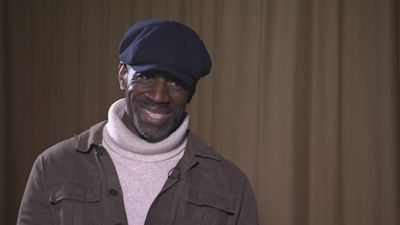Black Voices In Conversation: Playwright Olu Rowe on growing up in a white family

Black Voices In Conversation is a new series of interviews by ITV News to mark Black History Month 2020.
Across England, Wales and Northern Ireland we've spoken to groundbreaking individuals from the black community to learn about their life experiences and to hear their vision for the future.
ITV’s Nia Mason sat down with playwright, musician and Black History month south organiser, Olu Rowe, to talk about how he was adopted and raised by a white family.
Olu was raised in the 1970's, adopted by a white couple in Portsmouth. He grew up always singing and dancing and was encouraged to sing - even outside the house by friends.
"I was the only black child in the school and I remember coming onto the stage, and slightly freezing. Then I giggled and started playing and I just noticed the power of the audience engaging with me."
"I hadn’t discovered the real world until I was about 11" said Olu.
In 1976 Olu was sitting on a pavement when two white men drove a van at him deliberately. Olu's described that as the moment his view of the world changed.
"In the summer of 1976 we would often go swimming off this small pier and then go and sit on the pavements near some bungalows. I was thinking about whether I could fry an egg on the pavement as it was so hot that summer.
"There was a white van parked nearby – some guys doing work on a house looking at me – not in a friendly way. They got in the van and mounted the pavement. They drove at me. I had to roll back out of the way to prevent myself being hit by the van. My view of the world changed on that day. "
Growing up with white siblings Olu said he felt special. He said, "My mum alwaystold me I was chosen – I was a special child. But she would also stop people makinga fuss of me and the reasons why she did that was because she would tell me 'it’sall well people making a fuss now as you’re a cute little black boy, but when you’reolder and there’s some kind of trouble, the fingers will be pointing at you.' "
Olu went onto become a successful performer, singing and playing in bars and clubs. He recently wrote the play "Keep on Moving" based on his experiences and upbringing; the play begins on the moment he was almost run over.
"The play ran for two nights before the pandemic. The reaction was fascinating. A lot of people were unaware of that period we had come through in the eighties and the nineties.
"The opening scene starts with when I was almost run over. The first time my family knew about it, was when they came to see the play."
Now Olu works alongside others on Southampton's Black History Month events.
"Growing up I didn’t expect to be a successful businessman. I expected I would be accepted as a singer, a dancer and a runner. But we’ve done more than that- we’ve beeninventors, we’ve been composers, we have been great poets and many more things."